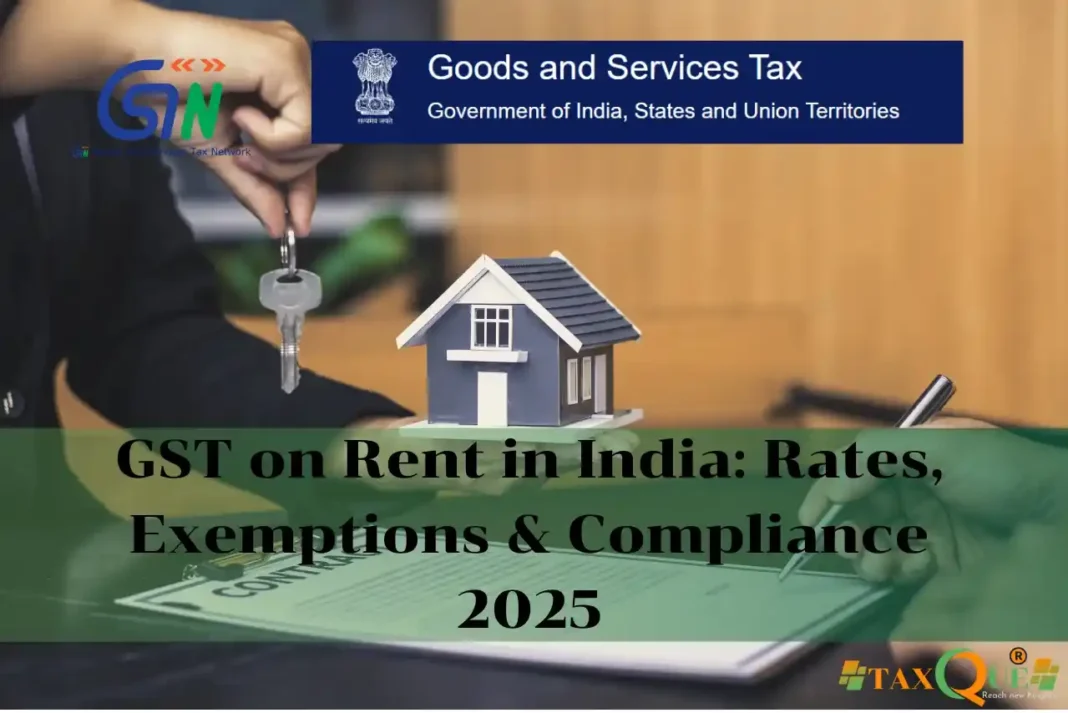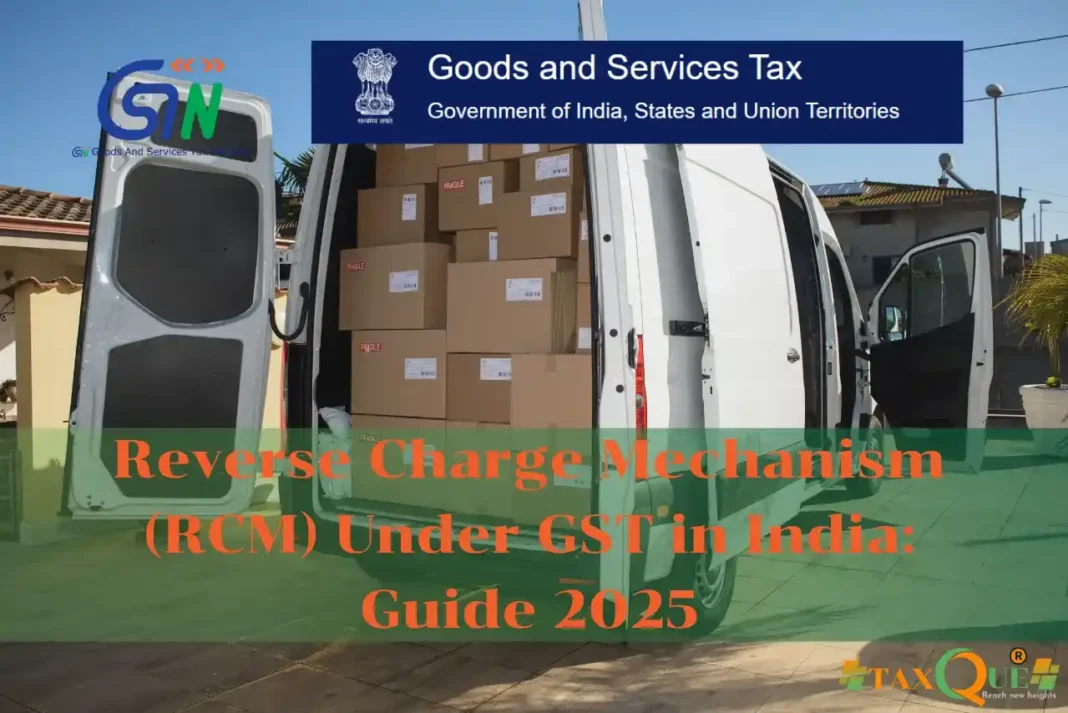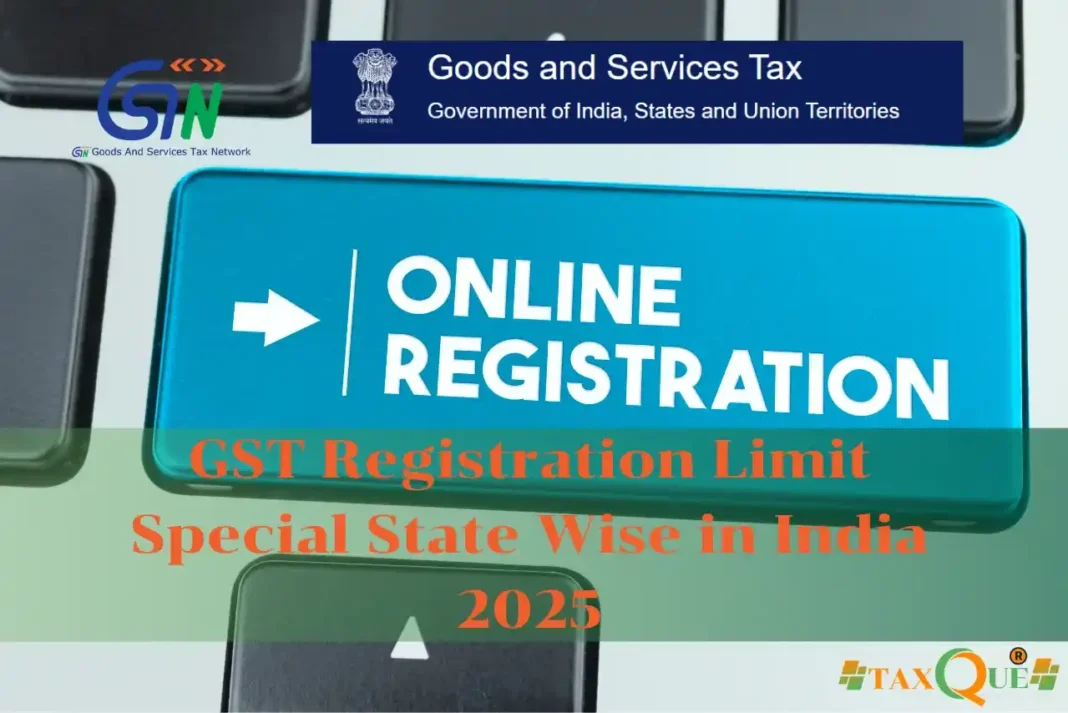Introduction
Understanding GST on rent is crucial for landlords, tenants, and businesses in India navigating the Goods and Services Tax (GST) regime, effective since July 1, 2017. GST, a unified tax under the Companies Act, 2013, applies to rental income as a supply of service, impacting commercial and certain residential properties in cities like Patna, Bangalore, or Hyderabad. This blog provides a comprehensive guide on GST on rent in 2025, detailing rates, exemptions, compliance requirements, and the Reverse Charge Mechanism (RCM), and highlights how TaxQue simplifies GST processes for businesses during company registration or property leasing.
What Is GST on Rent?
GST on rent refers to the tax levied under India’s GST framework on rental income from leasing immovable properties, classified as a supply of service under the CGST Act, 2017. The GST rate is typically 18% for commercial properties and certain residential rentals, with exemptions for residential properties used for personal residence. Administered by the GST Council, GST on rent replaces pre-GST taxes like 15% service tax, streamlining compliance but introducing nuances like RCM for registered tenants. Businesses in Patna or Bangalore must understand these rules during company registration to ensure proper GSTIN usage and compliance.
GST Rates and Exemptions for Rent
Below is a table summarizing GST on rent rates and exemptions for 2025, based on property type and usage:
| Property Type | GST Rate | Details |
|---|---|---|
| Residential (Personal Use) | Exempt | No GST if rented to an unregistered individual or registered person in personal capacity for residence (e.g., a family in Patna). |
| Residential (Business Use) | 18% | GST applies if rented to a GST-registered person for business purposes (e.g., corporate guesthouse in Bangalore). Payable under RCM by tenant since July 18, 2022 (47th GST Council). |
| Commercial (e.g., shops, offices) | 18% | Applies to all commercial rentals (e.g., warehouses in Hyderabad). Intra-state: 9% CGST + 9% SGST; Inter-state: 18% IGST. |
| Charitable/Religious Trusts | Exempt (Conditional) | Exempt if rent for rooms <₹1,000/day, shops/halls <₹10,000/day or month, managed by registered trusts. |
- Residential Exemption: Renting residential properties for personal residence is exempt, even for GST-registered tenants in personal capacity (e.g., a sole proprietor’s home in Hyderabad), per Notification No. 12/2017 and 05/2022.
- Commercial Rentals: 18% GST applies to shops, offices, or warehouses, collected by landlords or tenants under RCM if the landlord is unregistered. For a ₹50,000/month commercial rent, GST is ₹9,000.
- RCM for Government Properties: GST on rent charged by government/local authorities to registered persons is under RCM; unregistered tenants face forward charge by the government.
- Thresholds: Landlords with annual rental income (including all business activities) above ₹20 lakh (₹10 lakh in special category states like Assam, except Jammu & Kashmir/Assam at ₹20 lakh) must register for GST.
Compliance and Input Tax Credit (ITC)
GST on rent compliance involves:
- GST Registration: Mandatory for landlords with turnover above ₹20 lakh (₹10 lakh in special category states) or tenants under RCM for residential/business rentals. Register via the with state codes (e.g., 10 for Bihar).
- Invoicing: Landlords must issue invoices with GSTIN, HSN code (9972 for real estate services), and GST (18% for commercial, or RCM note for tenants). Intra-state splits into 9% CGST + 9% SGST; inter-state uses 18% IGST.
- ITC Eligibility: Registered tenants can claim ITC on GST paid for commercial rent or residential business use (e.g., ₹9,000 ITC on ₹50,000 rent), offsetting output tax liability. ITC is unavailable for exempt residential rentals.
- Returns Filing: File GSTR-1 (sales) and GSTR-3B (summary) monthly/quarterly, ensuring correct state codes (e.g., 29 for Karnataka).
- TDS: Tenants must deduct 10% TDS on rent exceeding ₹2.4 lakh annually (residential or commercial), but no GST applies on TDS.
- Penalties: Non-compliance incurs fines of ₹10,000–₹25,000, interest on unpaid taxes, or legal action.
Impact on Businesses and Landlords
The GST on rent has reshaped India’s rental market:
- Transparency: Clear GST rates (18% for commercial) and exemptions (residential personal use) reduce hidden charges, benefiting tenants in Bangalore or Hyderabad.
- Compliance Costs: RCM for registered tenants (e.g., businesses renting residential spaces for offices in Patna) increases complexity but allows ITC claims.
- Economic Benefits: GST revenue from commercial rentals (~₹1.5 lakh crore monthly in 2025) funds infrastructure, indirectly benefiting landlords.
- Challenges: Small landlords below ₹20 lakh turnover in normal states like Bihar avoid GST but miss ITC benefits; special state landlords face stricter ₹10 lakh limits.
- Company Registration: New businesses in Patna or Bangalore must assess rental agreements for GST implications during GSTIN registration, especially for commercial spaces.
TaxQue simplifies GST on rent compliance with expert support for GST registration, RCM compliance, and return filing. Visit TaxQue’s GST compliance guide or company registration services for tailored solutions.
FAQs
1. Is GST applicable on residential rent in India?
No, GST on rent is exempt for residential properties used for personal residence, but 18% applies if rented to a GST-registered person for business use under RCM.
2. What is the GST rate on commercial property rent?
Commercial rentals attract 18% GST, split as 9% CGST + 9% SGST intra-state or 18% IGST inter-state.
3. Who pays GST under RCM for rent?
Registered tenants pay 18% GST under RCM for residential properties used for business or commercial rentals from unregistered landlords.
4. Do small landlords need GST registration?
Landlords with annual rental income below ₹20 lakh (₹10 lakh in special category states) are exempt from GST registration.
5. How does TaxQue assist with GST on rent compliance?
TaxQue offers tools for GSTIN verification, invoice compliance, and RCM return filing. Explore TaxQue’s compliance services.
Conclusion
GST on rent in India, at 18% for commercial properties and certain business-use residential rentals, streamlines taxation while introducing compliance complexities like RCM. Exemptions for personal residential rentals provide relief, but businesses in Patna, Bangalore, or elsewhere must navigate state-specific thresholds during company registration. Platforms like TaxQue enhance GST on rent compliance with expert tools for registration, invoicing, and return filing. Stay informed, comply seamlessly, and manage rental income effectively in 2025.





